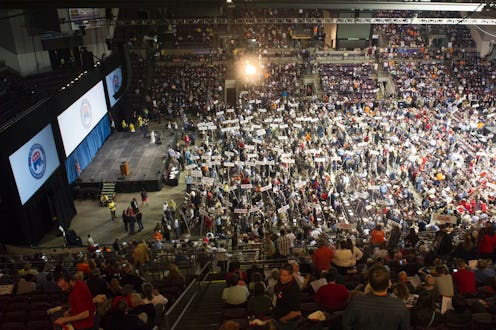Donald Trump has won 27 out of 40 Republican primaries and caucuses thus far, giving him 954 pledged delegates. In order to secure the Republican presidential nomination, he must secure at least 1,237 delegates by the time the GOP National Convention begins on July 18 in Cleveland. But how does the Republican National Convention work, and what are speculations of a contested convention referring to?
For starters, the Republican National Convention happens once every four years, and it has three main goals, according to the GOP's website: to determine the official platform of the Republican Party, to vote on rules pertaining to party governance, and to nominate candidates for President and Vice President. During most election years, one of the Republican candidates usually wins the majority of delegates during primary/caucus season, becoming the presumptive nominee before the convention begins. In this case, that candidate is able to obtain the nomination after the first ballot — or vote — of the convention, which is determined by a combination of the popular vote and superdelegate votes.
It is likely that this will soon be Trump's reality, but on the off chance that John Kasich and Ted Cruz's latest strategy pays off, let's take a look at what would happen if none of the candidates secure a delegate majority before the convention.
What Is A Contested Convention?
Closely related to and often also known as a brokered — or open — convention, a contested convention occurs when no candidate gets a majority of the delegates on the first ballot. In this case, the delegates to the convention vote again and again until a candidate reaches the magic number: 1,237 delegates. Cruz and Kasich are both fighting for an open convention, in the hopes that delegates initially pledged to Trump during the first ballot will shift their support to one of them in subsequent rounds. This can get a little complicated: Most state parties have specific rules about how many times their delegates are required to vote for the candidate to which they are initially pledged, but by the third round, most delegates are usually permitted to vote for the candidate of their choice.
Additionally, a Rules Committee of 112 party officials — two from each state and territory — are responsible for setting the rules for the convention, and they can change these rules right before the start of the convention if they choose, to potentially dramatic effects. For example, the Rules Committee could more quickly free delegates to vote for whomever they choose, and create new barriers to Trump's nomination.
Is A Contested Convention Likely This Year?
The only way Kasich and Cruz would be able to ensure an open convention this year would be by preventing Trump from getting a majority of pledged delegates before the convention. Their decision to focus on different states is an attempt to create plurality: Trump will still probably obtain more delegates than either Cruz or Kasich, but they're hoping that they can prevent him from getting to 1,237.
Because Cruz and Kasich have launched this strategy so late in the game, it is unlikely that a contested convention will occur. In the days before the convention, however, changes in party rules — like the eight-state rule that currently requires candidates to have won the majority in at least eight states in order to be nominated on the convention floor — could still change the game.
The last time a convention advanced past the first ballot was when the 1952 Democratic convention nominated Adlai Stevenson — who did not go on to win the election that year. For this reason, Cruz and Kasich should be wary: The last time a contested convention produced a winning president was in 1932, when Franklin D. Roosevelt won the nomination and then the presidency after initially not having enough delegates to secure his party's nomination.
